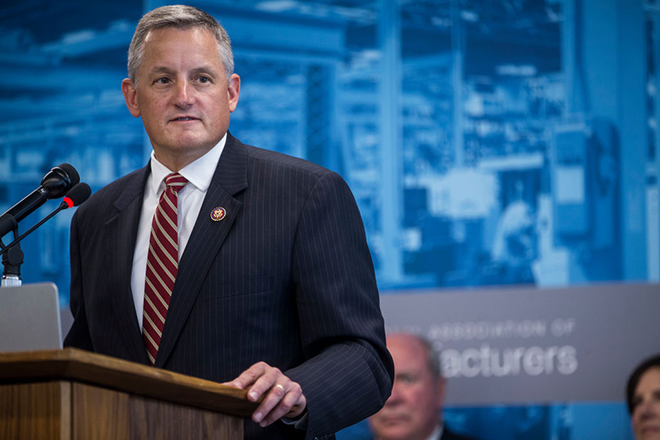Featured Topics
Featured Products
Events
S&P Global Offerings
Featured Topics
Featured Products
Events
S&P Global Offerings
Featured Topics
Featured Products
Events
S&P Global Offerings
Featured Topics
Featured Products
Events
Financial and Market intelligence
Fundamental & Alternative Datasets
Government & Defense
Professional Services
Banking & Capital Markets
Economy & Finance
Energy Transition & Sustainability
Technology & Innovation
Podcasts & Newsletters
Financial and Market intelligence
Fundamental & Alternative Datasets
Government & Defense
Professional Services
Banking & Capital Markets
Economy & Finance
Energy Transition & Sustainability
Technology & Innovation
Podcasts & Newsletters
12 Jan, 2021
By Ellie Potter

| U.S. Rep. Bruce Westerman, R-Ark., who will lead Republicans on the House Natural Resources Committee in the 117th Congress, speaks during a news conference Sept. 12, 2019, in Washington, D.C. Source: Zach Gibson/Getty Images News via Getty Images |
To ensure that the critical minerals needed to further develop renewable energy technologies are available, lawmakers should be willing to accommodate both renewable and mining interests, according to the leading Republican on the U.S. House Natural Resources Committee.
In an interview, U.S. Rep. Bruce Westerman, R-Ark., the new ranking member on the committee, said the two parties have "some common goals and objectives on wanting to be good stewards of the environment" and suggested that potential critical minerals legislation could reflect those areas of commonality.
China has a "death grip" on global critical minerals supply, while the U.S. will require more of these mined materials as it grows its renewable energy fleet, Westerman said.
"If we want to talk about environmental justice, social justice, economic justice, why wouldn't we work together to produce more of those critical minerals here in the U.S. where we've got an abundant supply of them instead of relying on China to provide all those things that are necessary for the new kind of technology that we need to achieve the goals that are out there?" the lawmaker said. "I think that's an area that should be bipartisan that we all ought to be able to work on."
Potential for compromise
After the recent elections, Democrats have a slimmer majority in the House while the Senate is evenly divided between the Republican and Democratic caucuses with Vice President-elect Kamala Harris poised to issue any tie-breaking vote. As a result, Democrats may be unable to pass more aggressive climate and clean energy legislation, especially given pushback on such proposals from some moderate Democrats from purple districts or states.
House Natural Resources Committee Chairman Raul Grijalva, D-Ariz., has called on Congress to update the nation's hard-rock mining laws, saying that doing so would be his top priority on the mining front. Westerman said he would support such updates if they provide both environmental and economic benefits.
"I would support updates that allowed us to develop our critical minerals here in the United States and do it in a cleaner, safer and healthier way," Westerman said. "But I wouldn't support updates that made it harder for us to produce critical minerals here in the U.S. while at the same time promoting policies that make a bigger demand for those minerals, which means we're going to rely even more heavily on China and other countries for those minerals."
The two committee leaders have spoken briefly since Republicans tapped Westerman as ranking member and have agreed to talk more, Westerman said.
"I think there are obviously issues where we can work together and where we can get those bills that are … really noncontroversial," Westerman said. "I think there's a common ground on those areas."
'Putting conservatives back into conservation'
Instead of seeking to eliminate the nation's carbon dioxide emissions through regulation, the U.S. should be investing in technology to make low-carbon energy more economical, relying on ingenuity and market influences to drive innovation, Westerman said. He also criticized Democrats for not backing low-carbon energy sources such as hydropower and nuclear energy.
The ranking member also touted his Trillion Trees Act, a bill that would commit the U.S. to planting trees to absorb carbon dioxide from the atmosphere.
"If you look at the carbon that's already in the atmosphere, there's only one way that's large-scale and economical to remove carbon, and that's with healthy forests," Westerman said. "Trees are the natural carbon-eaters, and plus, when you make things with wood, you're storing that carbon for the long-term."
Overall, Westerman said he was excited about his new leadership role on the committee, noting that natural resources is an area where the GOP can "make a lot of gains" as he seeks to "put conservatives back into conservation." The nation requires environmental solutions that will not threaten rural economies and increase energy costs, he said.
"Republicans are all about a cleaner, safer, healthier environment," Westerman said. "We just believe you can have that and a strong economy at the same time."